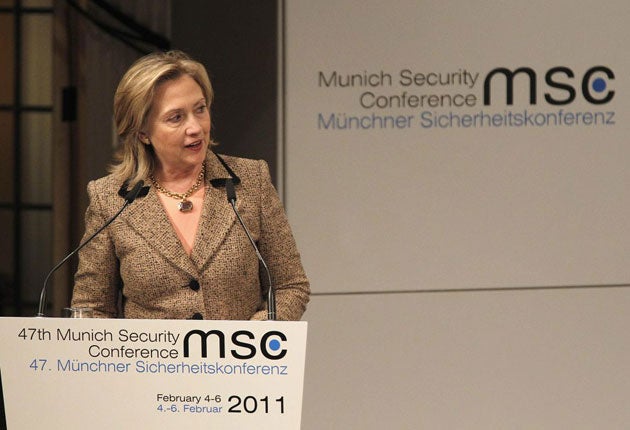Clinton warns of "perfect storm" in Middle East

The Middle East faces a "perfect storm" of unrest and regional leaders must quickly enact real democratic reforms or risk even greater instability, US Secretary of State Hillary Clinton said today.
Clinton, speaking at a security conference in Munich, said lack of political reform, coupled with a growing young population and new Internet technologies, threatened the old order in a region crucial to US security.
"The region is being battered by a perfect storm of powerful trends," Clinton said. "This is what has driven demonstrators into the streets of Tunis, Cairo, and cities throughout the region. The status quo is simply not sustainable."
Clinton's speech did not discuss in detail the political unrest in Egypt, which many analysts say is dominating discussions behind the scenes at the Munich conference which brings together a number of leaders, lawmakers and analysts.
But she underscored Washington's new public push for speedy political reform among its Middle East allies, which include not only Egypt and Jordan but global oil giant Saudi Arabia and Yemen, an impoverished state now central to the US-led war against al-Qa'ida.
"This is not simply a matter of idealism; it is a strategic necessity. Without genuine progress toward open and accountable political systems, the gap between people and their governments will grow, and instability will only deepen. All of our interests will be at risk," she said.
The Obama administration has repeatedly urged Egyptian President Hosni Mubarak to prepare for an "orderly transition" from power amid more than a week of unprecedented mass protests against his 30-year rule.
Obama himself, in his most pointed comments to date, urged Mubarak yesterday to "make the right decision" - though he again stopped short of publicly demanding that Mubarak step down immediately as the Egyptian protesters demand.
Clinton stressed the orderly transition theme in her bilateral meetings in Munich, which include British Prime Minister David Cameron, German Chancellor Angela Merkel, and a number of other leaders, diplomatic sources said.
One source said Clinton told her European colleagues that Mubarak was already effectively out of power but Egypt needed time to prepare for elections with a transitional government.
Since large demonstrations began in Cairo almost two weeks ago, Washington has distanced itself from its ally as officials try to work out how to ensure future stability in the country, which is is vital to American interests because of its peace treaty with Israel, control of the Suez Canal and steadfast opposition to militant Islam.
But Clinton's speech on Saturday cast the problem in far broader terms, repeating warnings she made last month in a speech in Qatar that the current political unrest signified an epochal change in the region.
Egypt's protests, inspired by a revolution that led former Tunisian President Zine al-Abidine Ben Ali to flee in January, have led to new protests in Jordan and Yemen, where leaders have pledged reforms.
Clinton said these and other regional leaders should make sure their promises are kept, and should not use the threat of extremism as an excuse to delay change.
"The transition to democracy will only work if it is deliberate, inclusive and transparent," she said, adding that incomplete reforms could lead to protest movements being "hijacked by new autocrats who use violence, deception and rigged elections to stay in power, or to advance an agenda of extremism."
No government in the region should count itself immune from the wave of change, she added.
"Some leaders may honestly believe that their country is an exception, that their people will not demand greater political or economic opportunities, or that they can be placated with half-measures. In the short term, that may be true; but as recent events prove, in the long term it is untenable."
Join our commenting forum
Join thought-provoking conversations, follow other Independent readers and see their replies
Comments